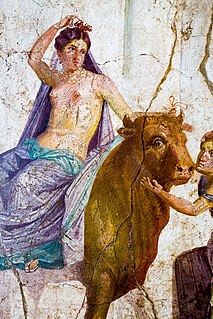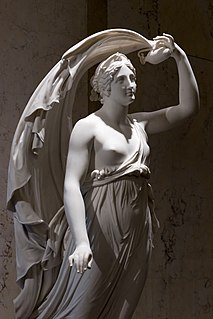
In Greek mythology, Minos was a King of Crete, son of Zeus and Europa. Every nine years, he made King Aegeus pick seven young boys and seven young girls to be sent to Daedalus's creation, the labyrinth, to be eaten by the Minotaur. After his death, Minos became a judge of the dead in the underworld.
Queen or QUEEN may refer to:
Mary, Queen of Scots (1542–1587), was queen regnant of Scotland and queen consort of France.

In Greek mythology, Europa was a Phoenician princess of Argive Greek origin, and the mother of King Minos of Crete. The continent of Europe is named after her. The story of her abduction by Zeus in the form of a bull was a Cretan story; as classicist Károly Kerényi points out, "most of the love-stories concerning Zeus originated from more ancient tales describing his marriages with goddesses. This can especially be said of the story of Europa."
A Javelin is a light spear intended for throwing. It is commonly known from the modern athletic discipline, the Javelin throw.

Ariadne was a Cretan princess in Greek mythology. She was mostly associated with mazes and labyrinths because of her involvement in the myths of the Minotaur and Theseus. She is best known for having helped Theseus escape the Minotaur but being abandoned by him on the island of Naxos; subsequently, she became the wife of Dionysus.

In ancient Greek religion and mythology, Iris is a daughter of the gods Thaumas and Electra, the personification and goddess of the rainbow and messenger of the gods, a servant to the Olympians and especially Queen Hera. Iris appears in several stories carrying messages from and to the gods or running errands, but has no unique mythology of her own. Similarly, very little to none of a historical cult and worship of Iris is attested in surviving records, with only few traces surviving from the island of Delos. In ancient art, Iris is depicted as a winged young woman carrying a caduceus, the symbol of the messengers, and a pitcher of water for the gods. Iris was traditionally seen as the consort of Zephyrus, the god of the west wind and one of the four Anemoi, by whom she is the mother of Pothos in some versions.
In European tradition, a zephyr is a light wind or a west wind, named after Zephyrus, the Greek god or personification of the west wind.

Dione was an ancient Greek goddess, Titaness primarily known from Book V of Homer's Iliad, where she tends to the wounds suffered by her daughter Aphrodite.
A comet is a small astronomical body which orbits the sun.

Maia, in ancient Greek religion, is one of the Pleiades and the mother of Hermes by Zeus.
Wanderer, Wanderers, or The Wanderer may refer to:
Strangers are people who are unknown to another person or group.
In Greek mythology, Europa is the name of:
In Greek mythology, Angelos or Angelia (Ἀγγελία) was a daughter of Zeus and Hera who became known as a chthonic deity.
Thebe is a feminine name mentioned several times in Greek mythology, in accounts that imply multiple female characters, four of whom are said to have had three cities named Thebes after them:
In Greek mythology, Europa or Europe is the name of the following figures:
This page is based on this
Wikipedia article Text is available under the
CC BY-SA 4.0 license; additional terms may apply.
Images, videos and audio are available under their respective licenses.





